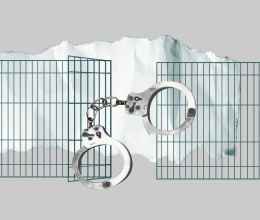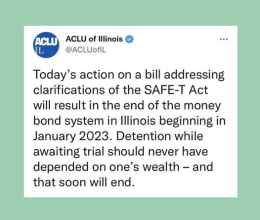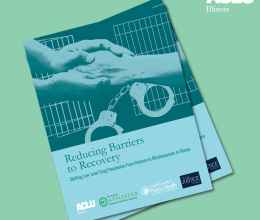
SPRINGFIELD – An Illinois legislative body is being told today that the State’s civil asset forfeiture laws are unfair, inconsistent and chaotic. The American Civil Liberties Union of Illinois today is calling on the legislature to work with urgency to rewrite these laws in order to ensure that Illinois residents whose property is seized by police cannot be permanently deprived of that property without clear proof that they were involved in criminal activity. The legislators will be told that Illinois recently received a failing grade for the fairness and transparency of its civil asset forfeiture laws.
“Our state’s laws in this area currently are grossly unfair,” according to Ben Ruddell, criminal justice policy attorney for the ACLU of Illinois. “As preposterous as it seems, you can lose your property – including your car, cash, or even your home – without ever being arrested or charged with a crime.”
“The system is bent to favor police and prosecutors who can use the laws as a profit center.”
The hearing on this issue is being held jointly by the Judiciary Civil and Criminal Committees of the Illinois House of Representatives. The hearing is set to begin at 4:00 p.m. in 114 Capitol. Among the witnesses will be two prominent Illinois defense attorneys who have dealt extensively with Illinois forfeiture law, as well as Lee McGrath from the Institute for Justice. That national organization, in a recent report evaluating states’ asset forfeiture laws, gave Illinois laws a grade of “D-“for fairness and transparency.
The Committee also will hear from Judy Wiese, a grandmother from the Quad Cities. She learned about the forfeiture laws the hard way when her car was seized after she lent it to her grandson, who turned out to be driving on a suspended license. No attorney was provided to assist Ms. Wiese to assist in getting her vehicle returned. Many people who face a similar situation must post a bond for 10% of the value of the car just to begin the process. It took five months without transportation, the intervention of the local media, and the kindness of strangers for Ms. Wiese to regain possession of her vehicle.
Residents of Illinois forfeit more than $20 million in property each year. The amount was more than $27 million in 2013. This amount does not account for seizures in Illinois by the federal government. The law provides that almost all of the money and property forfeited from Illinoisans goes directly to the law enforcement agency that seized the property. Many critics of forfeiture laws argue that such a system induces law enforcement to seize more property as a revenue generating opportunity.
“Police and prosecutors should not benefit from taking property away from persons when it is not justified,” added Ruddell. “It creates an incentive to engage in aggressive seizures that only hurt more people.”





